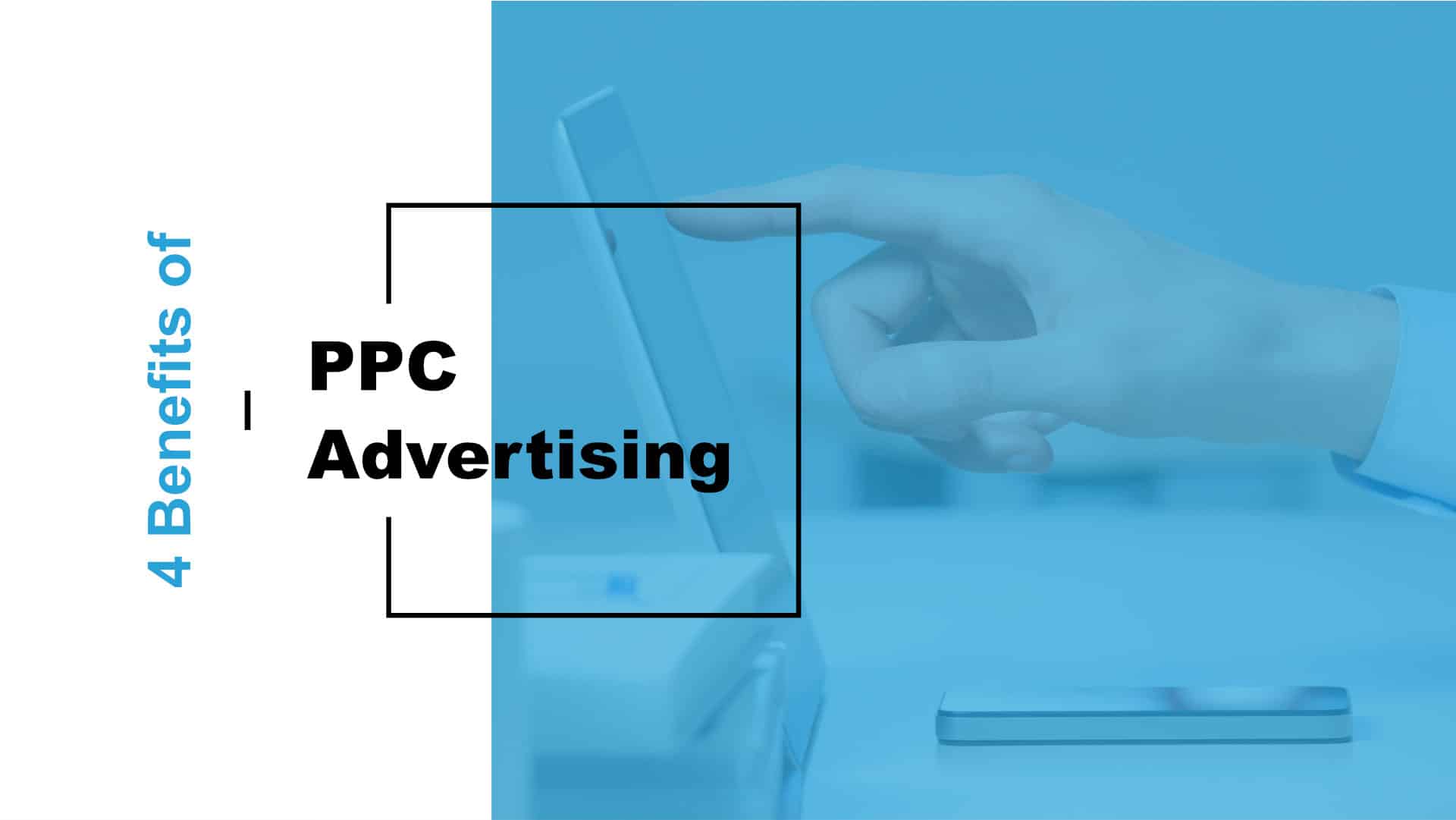
Think of all of the forms of marketing that businesses are told they need to employ to be successful: Facebook ads, an active Twitter account, email blasts, canvassing, and brand ambassadors, to name a few. However, one of the most effective means of advertising for businesses of all sizes comes in the form of Pay-Per-Click Advertising (PPC). This is where a business creates a budget for its online advertising campaigns and then uses a provider (like Google or Facebook) to publish those ads to a target audience. These are the ads you see on the top and sides of searches on Google, Bing, or Yahoo!. The difference between PPC and regular online marketing is that businesses only pay their provider when someone clicks on the ad; hence, Pay-Per-Click. PPC advertising has become a vital part of any successful digital marketing strategy, and here are just four of its many benefits.
Think of all of the forms of marketing that businesses are told they need to employ to be successful: Facebook ads, an active Twitter account, email blasts, canvassing, and brand ambassadors, to name a few. However, one of the most effective means of advertising for businesses of all sizes comes in the form of Pay-Per-Click Advertising (PPC). This is where a business creates a budget for its online advertising campaigns and then uses a provider (like Google or Facebook) to publish those ads to a target audience. These are the ads you see on the top and sides of searches on Google, Bing, or Yahoo!. The difference between PPC and regular online marketing is that businesses only pay their provider when someone clicks on the ad; hence, Pay-Per-Click. PPC advertising has become a vital part of any successful digital marketing strategy, and here are just four of its many benefits.
1.) Targeting Capabilites
1.) Targeting Capabilites
If a company is selling anything, it would make sense for them to advertise online to tap into the maximum number of potential customers. It’s incredibly likely that the business owner in question has heard about Google, Bing, or Facebook advertising, and so they’ll pursue those channels. While casting this wide net is an excellent first step, it’s not enough to guarantee success. Enter PPC. Mediums like Google and Facebook allow businesses to target specific audiences with their ads. Ads can be targeted towards people who fit specific demographics, use certain key-words, or even have visited your site before but didn’t complete a purchase (this is called remarketing).
If a company is selling anything, it would make sense for them to advertise online to tap into the maximum number of potential customers. It’s incredibly likely that the business owner in question has heard about Google, Bing, or Facebook advertising, and so they’ll pursue those channels. While casting this wide net is an excellent first step, it’s not enough to guarantee success. Enter PPC. Mediums like Google and Facebook allow businesses to target specific audiences with their ads. Ads can be targeted towards people who fit specific demographics, use certain key-words, or even have visited your site before but didn’t complete a purchase (this is called remarketing).
2.) Measurable
2.) Measurable
PPC advertising is primarily conducted through Google’s AdWords or Facebook Ads. Both of these avenues boast the ability to track performance and measure success through their integration with their respect analytics tools. If PPC is being done through Google, a business owner only has to set up Google Analytics on pages where the AdWords link to. This allows them to discern exactly how much traffic is being driven to their website from each ad and, as consequently, how cost-effective AdWords is relative to their business goals. For Facebook Ads, the Facebook Pixel tool offers business owners a similar analytical capability for PPC campaigns.

PPC advertising is primarily conducted through Google’s AdWords or Facebook Ads. Both of these avenues boast the ability to track performance and measure success through their integration with their respect analytics tools. If PPC is being done through Google, a business owner only has to set up Google Analytics on pages where the AdWords link to. This allows them to discern exactly how much traffic is being driven to their website from each ad and, as consequently, how cost-effective AdWords is relative to their business goals. For Facebook Ads, the Facebook Pixel tool offers business owners a similar analytical capability for PPC campaigns.

3.) PPC Can Work with SEO
3.) PPC Can Work with SEO
Any business that’s online deeply understands both how vital SEO is and how difficult it is to ensure its success. There’s a litany of sources touting different factors that affect a website’s ranking on search engines and it’s hard to know what’s truly accurate. This means that a business that’s figured out a successful SEO strategy is unlikely to want to employ new practices that might mess with their ranking. While this is a valid concern, it’s unjustified in regards to PPC. Changes to the ranking algorithm have minimal effect on a business’ ad’s likelihood of being clicked on. While PPC advertising on Google and Bing do receive updates, they’re not nearly as often or interruptive as the updates that affect SEO. Google’s findings have also shown that a website with strong organic search results has a higher likelihood of its PPC-ads being clicked through. Business owners who choose to utilize analytics on PPC campaigns can also identify crucial keywords that lead to higher engagement, which they can then utilize to strengthen SEO. In this way, employing PPC advertising in tandem with a well-optimized SEO strategy can help propel a website even further than previously thought possible.
Any business that’s online deeply understands both how vital SEO is and how difficult it is to ensure its success. There’s a litany of sources touting different factors that affect a website’s ranking on search engines and it’s hard to know what’s truly accurate. This means that a business that’s figured out a successful SEO strategy is unlikely to want to employ new practices that might mess with their ranking. While this is a valid concern, it’s unjustified in regards to PPC. Changes to the ranking algorithm have minimal effect on a business’ ad’s likelihood of being clicked on. While PPC advertising on Google and Bing do receive updates, they’re not nearly as often or interruptive as the updates that affect SEO. Google’s findings have also shown that a website with strong organic search results has a higher likelihood of its PPC-ads being clicked through. Business owners who choose to utilize analytics on PPC campaigns can also identify crucial keywords that lead to higher engagement, which they can then utilize to strengthen SEO. In this way, employing PPC advertising in tandem with a well-optimized SEO strategy can help propel a website even further than previously thought possible.
4.) Ease of Entry and Control
4.) Ease of Entry and Control
Regardless of whether a business already has an active PPC campaign or if they’re just hearing about it from this article, they can still successfully engage with PPC advertising. Ads for PPC campaigns can be conceived, budgeted for, written, targeted, and launched all from within the chosen platform within minutes. This means that a new stream of potential customers can be directed towards the site in less than an hour after the inception of a PPC initiative. This is in direct contrast to SEO campaigns which often take a long time to design, execute, and optimize. Once the campaign is started, the business owner has near complete control over its direction and scale. If PPC ads aren’t demonstrating a noticeable increase in traffic then they can easily be stopped, whereas a promising set of PPC ads can be dramatically scaled up with ease. Search engines like Google and Bing even let users control and edit the ads mid-campaign to ensure maximum optimization.
Regardless of whether a business already has an active PPC campaign or if they’re just hearing about it from this article, they can still successfully engage with PPC advertising. Ads for PPC campaigns can be conceived, budgeted for, written, targeted, and launched all from within the chosen platform within minutes. This means that a new stream of potential customers can be directed towards the site in less than an hour after the inception of a PPC initiative. This is in direct contrast to SEO campaigns which often take a long time to design, execute, and optimize. Once the campaign is started, the business owner has near complete control over its direction and scale. If PPC ads aren’t demonstrating a noticeable increase in traffic then they can easily be stopped, whereas a promising set of PPC ads can be dramatically scaled up with ease. Search engines like Google and Bing even let users control and edit the ads mid-campaign to ensure maximum optimization.
With content marketing and thought leadership dominating the digital marketing space, it can seem like there’s no other alternative to achieve high levels of reach and engagement. PPC dispels this myth by possessing the ability to simultaneously actualize of a myriad of business goals, whether that’s increasing brand promotion, yielding more newsletter signups, or increasing sales. PPC aids many parts of the sales process by streamlining the process of guiding prospects from simple awareness to becoming a paying customer.
With content marketing and thought leadership dominating the digital marketing space, it can seem like there’s no other alternative to achieve high levels of reach and engagement. PPC dispels this myth by possessing the ability to simultaneously actualize of a myriad of business goals, whether that’s increasing brand promotion, yielding more newsletter signups, or increasing sales. PPC aids many parts of the sales process by streamlining the process of guiding prospects from simple awareness to becoming a paying customer.